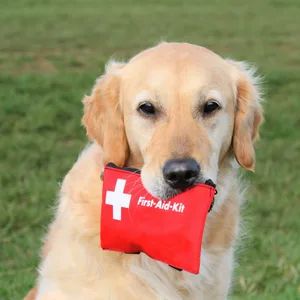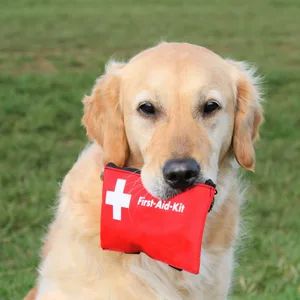Table of Contents
- Introduction
- Why Every Pet Owner Needs a First Aid Kit
- Essential Items for a Pet First Aid Kit
- Advanced Items for Special Situations
- How to Store and Organize Your Kit
- Situations Where the Kit Is Useful
- DIY vs Pre-Made Kits: Which Is Better?
- Pet First Aid Kit Checklist (Table)
- Where to Keep Your Pet First Aid Kit
- Keeping the Kit Updated
- How barkmeowhub.com Can Help You Stay Prepared
- Conclusion

1. Introduction
How to Build a Pet Emergency First Aid Kit : Our pets are more than just animals—they’re family. And just like any family member, they deserve to be safe, protected, and well-prepared for emergencies. Whether you’re dealing with a small cut, an insect bite, or a sudden illness, having a Pet Emergency First Aid Kit can be a literal lifesaver.
At barkmeowhub.com, we believe every pet owner should have a reliable first aid kit ready for unexpected situations. This article will help you create your own pet-specific emergency kit at home.
2. Why Every Pet Owner Needs a First Aid Kit
Emergencies can strike at any time—during a walk in the park, at home, or even while traveling. Unlike humans, pets cannot communicate pain effectively, and a delay in treatment can lead to serious complications.
Top Reasons to Keep a Pet First Aid Kit Handy:
- Quick response to injuries
- Prevention of infection
- Reduce trauma before veterinary help arrives
- Safe travel and outdoor adventures
- Peace of mind for pet parents
3. Essential Items for a Pet First Aid Kit
Let’s start with the basic items every pet first aid kit must include:
a. Gauze and Bandages
Use them to stop bleeding or protect wounds.
b. Adhesive Tape
To secure gauze or bandages—make sure it’s pet-safe.
c. Digital Thermometer
For checking fever or abnormal body temperature (insert rectally for pets).
d. Antiseptic Wipes or Solution
Like Betadine or Chlorhexidine to clean wounds.
e. Scissors and Tweezers
For trimming fur or removing splinters or ticks.
f. Disposable Gloves
To avoid infection while treating wounds.
g. Cotton Balls and Swabs
Useful for cleaning ears, wounds, or applying medicine.
h. Sterile Saline Solution
To rinse out eyes, wounds, or debris.
i. Hydrogen Peroxide (3%)
To induce vomiting (only under vet guidance).
j. Pet Medications
Include any prescribed or over-the-counter medications your pet may need.
4. Advanced Items for Special Situations
Once your basic kit is ready, you may consider adding more advanced tools:
- Styptic Powder or Pencil: Stops minor bleeding (especially after nail trims).
- Muzzle: Even calm pets may bite when in pain.
- Cold/Hot Pack: Helps manage swelling or heat stress.
- Syringes or Eye Droppers: For administering fluids or medicine.
- Emergency Blanket: To prevent hypothermia or shock.
- Tick Remover Tool: Safe removal of ticks from skin.
- Benadryl (Diphenhydramine): For allergic reactions—consult your vet for correct dosage.
- Activated Charcoal: For poison control (under vet supervision).
5. How to Store and Organize Your Kit
Organization is key when time is critical. Use a waterproof, clearly labeled container or a portable tool box. Divide it into compartments:
- First aid basics
- Medications
- Tools (scissors, tweezers, thermometer)
- Paperwork (vet info, vaccination records, instructions)
Label everything and keep instructions for any complex items.
6. Situations Where the Kit Is Useful
Here are real-world scenarios where your pet first aid kit could be life-saving:
| Situation | How the Kit Helps |
|---|---|
| Cut or scrape | Clean wound, stop bleeding with gauze |
| Insect bite or sting | Apply antihistamines, cold pack |
| Vomiting or diarrhea | Administer vet-approved medications |
| Foreign object removal | Use tweezers or flush with saline solution |
| Travel emergency | Use meds, gloves, blanket, vet records |
7. DIY vs Pre-Made Kits: Which Is Better?
Both options have pros and cons:
DIY Pet First Aid Kit
- Customizable to your pet’s needs
- Usually cheaper
- Requires time and research
Pre-Made Kits
- Convenient and quick
- Professionally curated
- May include unnecessary items
- Often more expensive
Pro Tip from barkmeowhub.com: Combine both! Start with a basic pre-made kit and add items specific to your pet’s health and lifestyle.
8. Pet First Aid Kit Checklist (Table)
| Item | Purpose | Quantity |
|---|---|---|
| Gauze Rolls | Wound dressing | 2–3 |
| Adhesive Tape | Securing bandages | 1 roll |
| Antiseptic Wipes | Cleaning wounds | 5–10 |
| Digital Thermometer | Checking body temperature | 1 |
| Scissors | Cutting fur/bandages | 1 |
| Tweezers | Removing splinters/ticks | 1 |
| Gloves (Disposable) | Sanitary treatment | 5 pairs |
| Hydrogen Peroxide (3%) | Induce vomiting (with vet approval) | 1 bottle |
| Cotton Balls/Swabs | Cleaning and medication | 20–30 |
| Saline Solution | Eye/wound flushing | 1 bottle |
| Emergency Blanket | Warmth in shock or cold | 1 |
| Benadryl Tablets | Allergic reactions (dose by vet) | As needed |
| Tick Remover Tool | Safe tick removal | 1 |
| Vet Contact Info | Emergency help | 1 card |
| Medical Records | Quick reference | 1 folder |
9. Where to Keep Your Pet First Aid Kit
- At Home: Store in a central, easy-access place (not too high or hidden).
- In Your Car: Always have a travel-size version for hikes, trips, or emergencies.
- While Traveling: Include pet passports, rabies certificates, and medications.
Keep one kit at each location if possible.
10. Keeping the Kit Updated
A first aid kit is only useful if it’s current.
- Check every 3–6 months
- Replace expired medications
- Restock used items
- Update records (vaccinations, new prescriptions)
barkmeowhub.com regularly posts reminders and tips on pet care—you can subscribe to stay updated.
11. How barkmeowhub.com Can Help You Stay Prepared
At barkmeowhub.com, we focus on practical advice that makes you a smarter pet parent. From in-depth guides on health, nutrition, training, to must-have product reviews, we ensure you’re always prepared.
Bookmark us, subscribe to our newsletter, and explore our resources on:
- Dog and cat care
- Emergency readiness
- Product reviews and recommendations
- Seasonal pet safety tips
12. Conclusion
A Pet Emergency First Aid Kit is not a luxury—it’s a necessity. Whether you’re a new pet owner or an experienced one, preparing for the unexpected can mean the difference between a minor issue and a medical emergency.
Start building your kit today and keep your furry family members safe.
For more pet safety and wellness tips, visit barkmeowhub.com — your trusted guide to responsible pet parenting in 2025.
